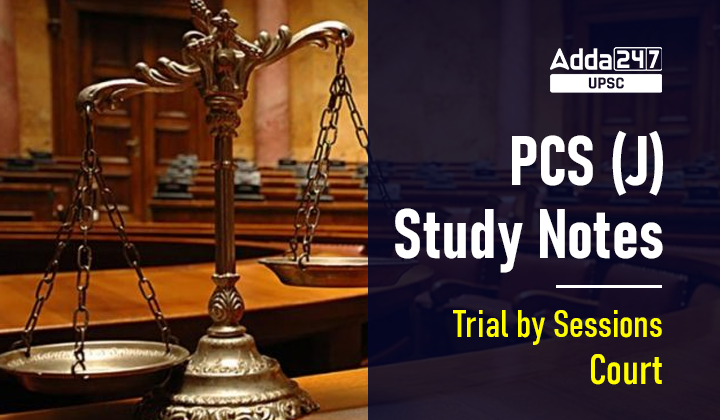Table of Contents
Trials by Sessions Court
Cases are assigned to either Sessions Court or Magistrate Court according to the I schedule of the Criminal Procedure Code (Cr.P.C). Sessions Court is a type of District Court with criminal jurisdiction. It is important to remember that the Court of Session does not have original jurisdiction over cases, but rather, matters are committed to the Court of Session by the Magistrate pursuant to section 209 of the Cr.P.C if they may only be tried in the Session Court. It is important to highlight that the Session Court has jurisdiction over crimes involving a maximum sentence of life imprisonment, the death penalty, or more than seven years in jail.
The trial before a court of Sessions proceeds under Cr.P.C as follows:
- Section 225: The Public Prosecutor will lead the prosecution in the trial before the Court of Session.
- Section 226: The Public Prosecutor will initiate prosecution by detailing the charge and presenting the evidence in the case.
- Section 227: After hearing arguments from both sides, if a judge determines there is insufficient evidence to find the accused guilty or move further with the case, he or she will grant the defendant a discharge and reason wherefore. After this point, neither party can question any more witnesses, but they can continue to defend their case.
- Section 228: If the judge, after reviewing the evidence, concludes that there are insufficient grounds for continuing against the accused, he will discharge the accused and note the basis for his decision.
- Section 229: If the accused pleads guilty, the judge will decide whether or not to find them guilty.
- Section 230: If the accused does not enter a guilty plea, the case will proceed to trial, and a date will be set for the judge to question witnesses and review evidence.
- Section 231: On the appointed day, the judge will review the prosecution’s evidence. Whether or whether not a witness is subject to examination or cross examination is at the discretion of the Judge.
- Section 232: If the prosecution cannot prove guilt beyond a reasonable doubt, the court may find the accused not guilty.
- Section 233: Should he not be found not guilty, the accused must now provide his defence.
- Section 234: After the defence has presented its argument, the prosecution will rest its case and the defence will have an opportunity to rebut.
- Section 235: After hearing both sides of the case, the judge will issue a verdict of guilty or not guilty. A sentencing hearing will be held if the defendant is found guilty.
सत्र न्यायालय के समक्ष मुकदमा
आपराधिक प्रक्रिया संहिता (सीआरपीसी) की अनुसूची के अनुसार मामले या तो सत्र न्यायालय या मजिस्ट्रेट न्यायालय को सौंपे जाते हैं। यह याद रखना महत्वपूर्ण है कि सत्र न्यायालय के पास मामलों पर मूल अधिकार क्षेत्र नहीं है, बल्कि, सीआरपीसी की धारा 209 के अनुसार मजिस्ट्रेट द्वारा मामले सत्र न्यायालय के लिए प्रतिबद्ध हैं यदि उन पर केवल सत्र में विचार किया जा सकता है कोर्ट। यह उजागर करना महत्वपूर्ण है कि सत्र न्यायालय के पास उन अपराधों पर अधिकार क्षेत्र है जिनमें अधिकतम आजीवन कारावास, मृत्युदंड, या सात साल से अधिक जेल की सजा शामिल है।
सत्र न्यायालय के समक्ष सीआरपीसी के तहत मुकदमा निम्नानुसार चलता है:
- धारा 225: लोक अभियोजक सत्र न्यायालय के समक्ष मुकदमे में अभियोजन का नेतृत्व करेगा।
- धारा 226: लोक अभियोजक मामले में आरोप का विवरण और सबूत पेश करके अभियोजन शुरू करेगा।
- धारा 227: दोनों पक्षों की दलीलें सुनने के बाद, यदि कोई न्यायाधीश यह निर्धारित करता है कि आरोपी को दोषी ठहराने या मामले को आगे बढ़ाने के लिए पर्याप्त सबूत नहीं हैं, तो वह प्रतिवादी को आरोपमुक्त कर देगा और इसलिए कारण देगा। इस बिंदु के बाद, कोई भी पक्ष किसी और गवाह से पूछताछ नहीं कर सकता है, लेकिन वे अपने मामले का बचाव करना जारी रख सकते हैं।
- धारा 228: यदि न्यायाधीश, सबूतों की समीक्षा करने के बाद, यह निष्कर्ष निकालता है कि आरोपी के खिलाफ जारी रखने के लिए अपर्याप्त आधार हैं, तो वह आरोपी को आरोपमुक्त कर देगा और अपने निर्णय के लिए आधार नोट करेगा।
- धारा 229: यदि आरोपी दोषी ठहराता है, तो न्यायाधीश तय करेगा कि उन्हें दोषी पाया जाए या नहीं।
- धारा 230: यदि आरोपी दोषी याचिका में प्रवेश नहीं करता है, तो मामला सुनवाई के लिए आगे बढ़ेगा, और न्यायाधीश के लिए गवाहों से पूछताछ करने और साक्ष्य की समीक्षा करने के लिए एक तिथि निर्धारित की जाएगी।
- धारा 231: नियत दिन पर न्यायाधीश अभियोजन पक्ष के साक्ष्य की समीक्षा करेंगे। गवाह की परीक्षा या जिरह का विषय है या नहीं, यह न्यायाधीश के विवेक पर निर्भर करता है।
- धारा 232: यदि अभियोजन एक उचित संदेह से परे अपराध साबित नहीं कर सकता है, तो अदालत आरोपी को दोषी नहीं मान सकती है।
- धारा 233: अगर उसे दोषी नहीं पाया जाता है, तो आरोपी को अब अपना बचाव देना चाहिए।
- धारा 234: बचाव पक्ष द्वारा अपना तर्क प्रस्तुत करने के बाद, अभियोजन पक्ष अपने मामले को आराम देगा और बचाव पक्ष को खंडन करने का अवसर मिलेगा।
- धारा 235: मामले के दोनों पक्षों को सुनने के बाद न्यायाधीश दोषी या दोषी नहीं होने का फैसला सुनाएगा। दोषी पाए जाने पर सजा पर सुनवाई की जाएगी।



 TSPSC Group 1 Question Paper 2024, Downl...
TSPSC Group 1 Question Paper 2024, Downl...
 TSPSC Group 1 Answer key 2024 Out, Downl...
TSPSC Group 1 Answer key 2024 Out, Downl...
 UPSC Prelims 2024 Question Paper, Downlo...
UPSC Prelims 2024 Question Paper, Downlo...






